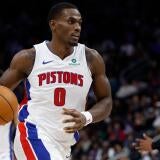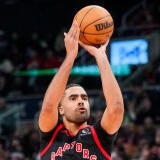In defense of the Kyrie Irving trade: Why the Mavericks made the right move even if it hasn't worked out (yet)
The risk of going all-in to get a star next to Luka Doncic was greater than not getting one

Let's play a little game. I'm going to describe an NBA team, and let's see if you can guess who I'm talking about. This team drafted a generational talent. It missed the playoffs in his debut season, but that player was so good, so quickly that his front office didn't have a chance to really build around him through the draft. That team progressed pretty quickly. By his fourth season in the NBA, it managed to stun the basketball world and go on a deeper playoff run than anyone expected. That run was the team's peak with the generational player.
You might think, given the headline of this story, that I'm describing the 2021-22 Dallas Mavericks. I'm not, or at least I don't have to be. No, the team I'm describing is the 2006-07 Cleveland Cavaliers, or more broadly, the entire 2003-10 era. Now that you line the arcs up next to one another, they look pretty similar, don't they?
LeBron James and Luka Doncic both won Rookie of the Year. Both of their teams landed at the No. 10 pick in the following NBA Draft, but neither of them made anything of it. Cleveland wasted their choice on Luke Jackson. Dallas sent theirs (Cam Reddish) to Atlanta as part of the Doncic deal. Both were in the playoffs by their their season. James dragged the Cavaliers to the NBA Finals in his fourth season. Doncic came one round short in a much tougher Western Conference. Cleveland fell to fourth place in the East in 2008. That's where the Mavericks sat on Feb. 3, 2023, the day Kyrie Irving asked for a trade.
This was a potential inflection point for the Mavericks. It isn't clear whether the Cavaliers ever had such an opportunity. It's been over a decade and still isn't clear if they actually could have traded J.J. Hickson for Amar'e Stoudemire. All we can say for certain is that the Cavaliers never found a co-star like Irving for James during his first tour through Cleveland. He left for Miami in part to find such a teammate. The Mavericks saw an opportunity to give Doncic that kind of player in Dallas and they took it.
The raw results have been miserable. While Irving's individual numbers have actually improved since he became a Maverick, the team as a whole is 9-17 since acquiring him. They are 5-11 with both Irving and Doncic on the floor. Not only did they fall from No. 4 to No. 11 in the standings after the trade, but they considered their postseason hopes so slim that they actually tanked their last two games of the season for the sake of draft position.
There's correlation here, and a bit of causation as well. Irving played as well as the team expected, but his presence cost Dallas some of the defense and depth that made last year's group special. As bad as the numbers were, the vibes were worse. "I used to have fun," Doncic grumbled after one of the humiliating losses to Charlotte's B-Team in the stretch run of the season. Those are the sort of quotes that get repeated ad nauseum when a team loses a player of Doncic's caliber. Those are the stakes of every decision facing the Mavericks now. If they fail to put a suitably talented team around Doncic, history says he's going to leave. The Mavericks themselves are reportedly worried about that possibility. They could potentially lose Irving for nothing as a free agent this offseason, and even if they don't, it's entirely possible that the fallout of this trade directly leads to Doncic's eventual departure.
And it was still the right decision, if you trust the tale of the 2003-10 Cavaliers, the first leg of James' NBA career. Cleveland ranked second and eighth in defense in their last two years with James. They had the depth to win 127 regular-season games in that span. It didn't matter. James wanted to win championships. Superstars don't win championships without other superstars on their teams. Cleveland didn't have another one. Dallas probably didn't have another way to get one.
Had their season continued uninterrupted without an Irving trade, Dallas likely would have reached the play-in round or even the playoffs proper. There, they would have lost to a team with more high-end talent. They would have sent their first-round pick to the Knicks thereafter, officially completing the Kristaps Porzingis trade and giving themselves trade access to their entire seven-year collection of first-round picks. This was theoretically the plan before the Irving deal. Wait until the offseason, see which big name becomes available, and then offer some variant of the James Harden/Kevin Durant trade package for that player: Up to four first-round picks and three first-round swaps.
That plan might not have been necessary had the Mavericks retained Jalen Brunson, but that ship had sailed by the time this season arrived. Doncic himself might have accelerated the timeline when he reportedly asked for help in January. Ultimately, that was likely immaterial. The trade landscape is changing.
The Thunder currently have 15 first-round picks at their disposal. They might be an extreme, but they're hardly an outlier. San Antonio and Utah have built up war chests as well by trading their own veterans. Those markets aren't desirable enough? Fine, both New York teams have extra picks to trade. But what if the star in question wants to go to a winner? No problem. New Orleans still has a bounty of Lakers and Bucks picks to dangle. Houston has all of those valuable Nets picks and may be getting James Harden back this summer. Memphis has all of its own picks, plus a very lightly-protected Warriors pick coming in 2024.
In other words, the Mavericks were outgunned. Demand for star players has now significantly outpaced supply, and the Mavericks were never going to win a fair bidding war for one. Perhaps a star would have pushed to play for Dallas, specifically, but their laughable history as a free agent destination with Dirk Nowitzki in the building suggests that was unlikely. Couple all of that with the limited value any pick attached to a team with Luka Doncic and another superstar would carry and you get the formula for years of roster-building disappointment. The Mavericks were simply never going to trade for a traditional superstar to pair with Doncic.
So they took the untraditional route and traded for a star those other teams don't want. While the cost of acquiring Irving was considerable, it was hardly bankrupting: one first-round pick, one three-and-D wing (Dorian Finney-Smith) and a ball-handler in Spencer Dinwiddie that Irving was set to replace. Dallas will still have two future first-round picks to dangle in trade negotiations this offseason. One of those picks will probably be a 2023 lottery selection. They have plenty of sizable salaries to attach to those picks for worthwhile, defensive-minded veterans. Depending on how quickly the NBA implements the changes instituted in the new CBA, they may still have a taxpayer mid-level exception to throw at a free agent as well.
Fixing this team is going to require deft offseason management. The Mavericks have to maximize those picks. They need to steal one or two notable free agents for bargain-basement prices. They need to stay healthy, and they need their few in-house youngsters (Jaden Harden and Josh Green) to make significant leaps next season. They need a lot of things to go right if they plan to meaningfully compete for the 2024 championship.
They have that in common with basically every other recent champion. The 2022 Warriors nearly chose Avery Bradley over Gary Payton II at training camp and would not have won the title if they had. The 2021 Bucks may have landed Jrue Holiday in the offseason, but they also convinced Bobby Portis to take an enormous pay cut in free agency and lucked out when Houston didn't include P.J. Tucker in the Harden deal with Brooklyn, allowing them to swoop in and nab Tucker themselves. The 2020 Lakers stumbled upon Dwight Howard and Markieff Morris as minimum-salary free agents and turned the previously undrafted Alex Caruso into a starter in their Finals clinching game.
In short, the Mavericks aren't far off from where those teams were. They need to get the offseason right, but the hardest part is done. No amount of Gary Payton IIs or Kevon Looneys or Otto Porters were winning the Warriors a championship without Stephen Curry, Klay Thompson, Draymond Green and Andrew Wiggins. The Lakers won the 2020 title because they had LeBron James and Anthony Davis just as the 2003-10 era Cavaliers failed to win a title because they didn't have a Davis.
The best-case scenario for the pre-Irving trade Mavericks was something resembling those late 2000s Cavaliers, and it's not even clear if that was an attainable goal for them. Last year's Mavericks ranked seventh on defense. They were 21st the year prior and 24th this season even before Irving's trade request. Six of the 10 most-used Mavericks this season are at least 30, so it's not clear how much longer their depth would have held up anyway. Their trip to the Western Conference finals a season ago masked how desperate a situation the Mavericks are truly in.
They needed a big swing to even give themselves a chance to convince Doncic that he can win a championship in Dallas. That swing might end up missing. But if you asked the Cavaliers in mid-July of 2010 if they wished they'd taken bigger risks when they were trying to build around James, the answer they'd almost certainly give you is yes. Hometown sentiment eventually brought James back to Cleveland. Their first major move after reacquiring him was to trade for Kevin Love. The Serbian Doncic has no such ties to Dallas. If he leaves, he's gone for good. By trading for Irving, the Mavericks at least gave themselves a chance to keep Doncic. That's a chance the Cavaliers never gave themselves in James's first chapter.


















